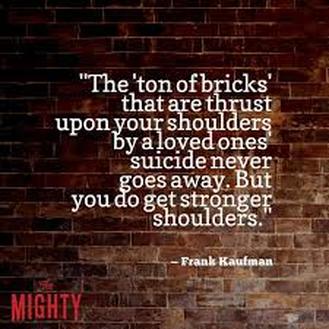 For the person you lost, the pain is over. Now is the time to start healing yours. A Handbook for Survivors of Suicide by Jeffrey Jackson I discovered the term survivor of suicide loss only when I lost my husband to suicide last year. Until then, death by suicide was something that happened to others. It happened in other families. Not in mine. People who died of suicide were faceless, nameless statistics. However, all these defenses crumbled when I had to confront the staggering reality of my loss. A survivor of suicide loss is someone who has lost a person dear to them to suicide. A close family member, a dear friend, colleague or a health care professional (notably mental health professional) could at any point be a survivor of suicide loss. “You are a “survivor of suicide,” and as that unwelcome designation implies, your survival—your emotional survival—will depend on how well you learn to cope with your tragedy. The bad news: Surviving this will be the second worst experience,” writes Jeffrey Jackson, a survivor of suicide loss, in AHandbook for Survivors of Suicide. Suicide, as we all know, is an intentional self-inflicted death. Edwin Shneidman, the pioneering suicidologist, vividly describes suicide as “psych ache” or intense psychological pain. Not surprisingly, mental health issues have been identified as a predisposing factor in 90 percent of deaths by suicide. According to the American Association of Suicidology[1], “the primary goal of a suicide is not to end life, but to end pain.” The statistics are indeed grim.
Death and the resulting emotion grief—the loss of someone we love—are universal experiences. However, a death by suicide, has been described as a death like no other. Suicide, like death by accidents, murder (homicide) and even unanticipated sudden death, is another form of traumatic death. However, death by suicide doesnot elicit the same level of compassion and empathy in people to support the bereavement process. This huge empathy deficit makes a survivor of suicide loss feel isolated and excluded. The American Psychiatry Association (APA), suicide bereavement as “catastrophic” on par with a concentration camp experience. According to the APA, family members of individuals who die by suicide—including parents, children, and siblings—are at increased risk of suicide—almost 400 times higher than others. Survivors of suicide loss are invisible and marginalised. They often encounter blame, judgment or social exclusion, while mourners of loved ones who have died from terminal illness, accident, old age or other kinds of deaths usually receive sympathy and compassion. Thus, grief and the grieving process for survivors of suicide loss is complex and complicated. It is compounded by negative societal attitudes based on stigma, shame, secrecy and silence around suicide. This is because we tend to view suicide through a morality lens rather than a public health crisis and mental health issue, which it truly is. “It’s strange how we would never blame a family member for a loved one’s cancer or Alzheimer’s, but society continues to cast a shadow on a loved one’s suicide,” writes Deborah Serani in Understanding survivors of suicide loss[2]. There is a strong sense of shame associated with suicide. Most survivors of suicide loss prefer not talk about suicide; of someone who died by suicide. We are deeply ashamed to admit this. Instead we tend to create “acceptable” explanations of the cause of death that we choose to tell others. If a loved one dies of suicide and someone asks us about the cause of death, we often tend to say, “It was a heart attack” or some other “natural” cause of death that is socially acceptable. We do not seek to glorify suicide; nor do we condemn it. People who die of suicide are not heroes; nor cowards; nor criminals. Suicide is nota crime. It is public health crisis. It is a mental health issue that is treatable and preventable. Such informed perspectives can change conversations on suicide and also ensure supportive spaces for survivors of suicide loss to rebuild their lives. [1]https://www.suicidology.org/ [2]https://www.psychologytoday.com/us/blog/two.../understanding-survivors-suicide-loss\
1 Comment
Kamaraju P
3/25/2021 08:41:51 pm
Luckily for me, I ran into a write-up on Nandini Murali in TOI and I have discovered how potential a writer can be. Her account of her experience is most moving for me and I sincerely wish I had shared great grief.May she always stand strong in her adventures of life.
Reply
Leave a Reply. |
Dr. Nandini MuraliDr. Nandini Murali is a feminist and a gender and diversity professional. She is an author who also provides technical support in communications for the social sector. When she is not working, she heads off to the forests with her camera. Currently, she has a magnificent obsession with photographing leopards! Archives
October 2018
Categories |

 RSS Feed
RSS Feed
